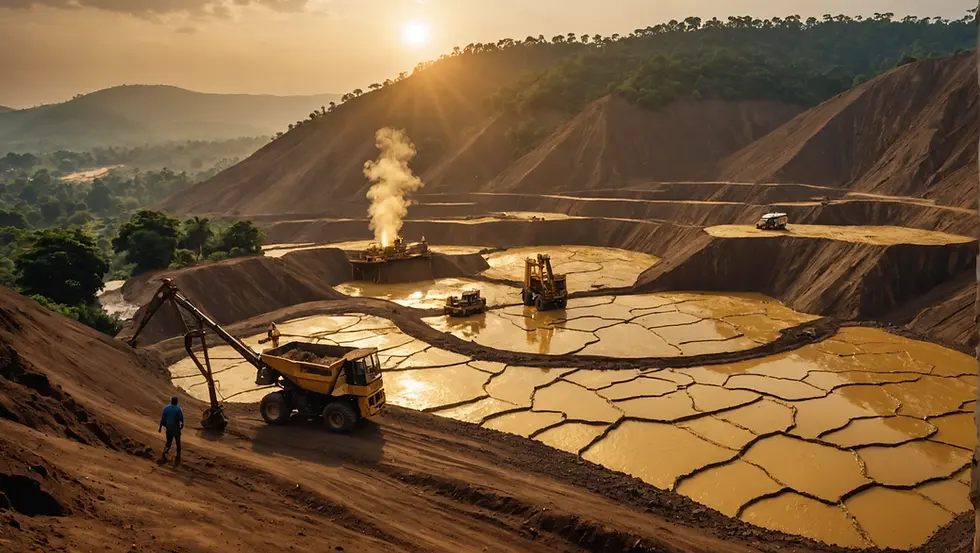How to Source Ethically Produced Minerals from the DRC: Navigating Complex Supply Chains
- Aminata

- Sep 29, 2024
- 4 min read
Updated: Nov 9, 2024
In today's global economy, sourcing ethically produced minerals is more important than ever. The Democratic Republic of the Congo (DRC) is home to vital minerals like cobalt, coltan, and gold, which are key components in electronics and renewable energy. Unfortunately, the supply chains for these materials are often complicated, with serious concerns around human rights abuses, environmental harm, and funding of conflict.
This post will guide companies and individuals on how to source minerals from the DRC ethically. PS, you can contact us directly- any time to guide you through this process
Understanding the Complex Landscape
Before you can source ethically, it's crucial to understand the DRC's mineral production landscape. The sector features both large multinational companies and small-scale artisanal miners, with the latter operating in a largely unregulated environment. According to a recent report, around 90% of the DRC's mineral production is linked to artisanal mining, which often faces challenges like unsafe conditions and the risk of child labor.
NEW technologies and international regulations are making it easier for businesses to ensure their supply chains do not involve conflict minerals. This comprehensive approach is essential for ethical sourcing.
Research and Identify Your Sources
To start sourcing ethically produced minerals, thorough research is necessary. Identify potential suppliers and evaluate their practices. Look for companies that belong to organizations like the Responsible Minerals Initiative (RMI) and adhere to the OECD Due Diligence Guidance for Responsible Supply Chains. Zaïre Mineral Merchant is a trusted sourcing partner and help you with this. Schedule a call with us here.
Consider sourcing from larger firms or cooperatives that have undergone third-party audits, which typically review their compliance with environmental standards and labor rights. For example, a study found that companies sourcing from RMI-registered suppliers improved supplier practices by over 30% within the first year.
Assessing Artisanal and Small-Scale Mining
Artisanal and small-scale mining (ASM) is a significant part of the DRC's economy, providing livelihoods for millions. However, it is also associated with various ethical risks. In a recent survey, about 30% of ASM workers reported unsafe working conditions and lack of basic amenities.
As Zaïre MM, I am careful to only partner with ethical mining operators and owners and have the paperwork to prove it. My team and I can help you stay compliant of relevant human rights laws.
If sourcing from ASM, engage with local miners and communities directly, a participatory approach helps ensure sustainable and ethical practices. For instance, developing partnerships with NGOs can provide valuable information on local mining conditions. In 2021, a collective effort between NGOs and miners improved safety standards for over 1,000 ASM workers in the region.
Implementing Due Diligence Procedures
Implementing solid due diligence procedures is vital for ethical sourcing. Companies should adopt a risk management framework that aligns with international standards. This includes assessing the entire supply chain, from extraction to distribution.
Documentation is essential. Keep records of supply chain audits, contracts, and communications with suppliers. Transparent communication about labor practices and environmental standards builds trust and ensures compliance.
Collaborate with Stakeholders
Collaboration with various stakeholders strengthens ethical sourcing efforts. Work with NGOs, local communities, and government entities to gain insights and monitor conditions in mining regions. For example, partnering with local agencies can lead to more effective oversight of mining activities and help reduce risks.
These collaborations can foster improved governance in the supply chain. Supporting community-based initiatives can lead to more sustainable mining practices and drive long-term social and environmental stability.

Utilize Technology for Traceability
Using technology enhances transparency in mineral supply chains. Blockchain offers a secure way to verify the origins of minerals, reducing the risk of sourcing conflict minerals.
Tools like GPS mapping and digital tracking can provide insights into the sourcing process. By ensuring that all parties adhere to ethical standards using these technologies, companies can maintain compliance and build trust with consumers.

Advocacy and Continuous Improvement
Ethical sourcing requires ongoing commitment. Advocate for responsible practices in the industry to foster change and improve conditions across the supply chain. Engaging in discussions about ethical sourcing and collaborating with industry leaders can help in sharing best practices.
Regular improvements to sourcing strategies ensure that businesses stay adaptable to evolving conditions in the DRC and changing ethical standards.
The Journey Towards Ethical Sourcing
Sourcing ethically produced minerals from the DRC is complex but achievable. By thoroughly understanding the mining landscape, conducting in-depth research, and engaging with stakeholders, we can all create a responsible and transparent supply chain.
Investing in training, leveraging technology for traceability, and continuously advocating for better practices will benefit not only the businesses involved but also the communities that rely on these minerals. The steps you take today can help set a new standard for ethical sourcing in the mineral industry, influencing positive change for years to come.
In an era where corporations must demonstrate their commitment to ethical practices, establishing responsible sourcing in the DRC can pave the way for others to follow.
Are you looking to buy and export Gold, Diamond or Copper from the DRC? We can help you that. Find us on Whatsapp below:


Comments